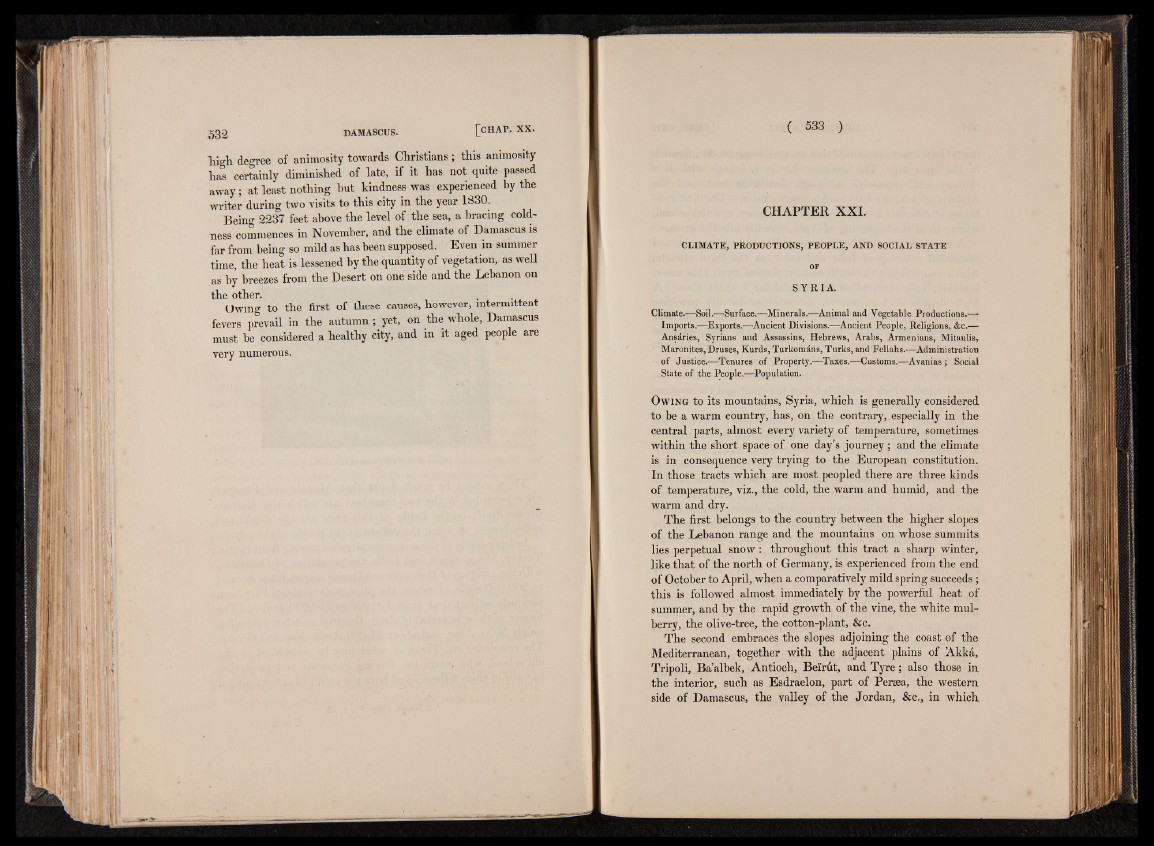
high degree of animosity towards Christians ; this animosity
has certainly diminished of late, if it has not quite passed
away ; at least nothing but kindness was experienced by the
writer during two visits to this city in the year 1830.
Being 2237 feet above the level of the sea, a bracing coldness
commences in November, and the climate of Damascus is
far from being so mild as has been supposed. Even in summer
time, the heat is lessened by the quantity of vegetation, as well
as by breezes from the Desert on one side and the Lebanon on
the other.
Owing to the first of these causes, however, intermittent
fevers prevail in the autumn ; yet, on the whole, Damascus
must be considered a healthy city, and in it aged people are
very numerous.
CHAPTER XXI.
CLIMATE, PRODUCTIONS, PEOPLE, AND SOCIAL STATE
OF
S Y R I A.
Climate.—Soil.— Surface.—Mineralsjp-Animal and Vegetable Productions.—•
ImportsB-Exports.—Ancient Divisions.-—Ancient People, Religions, &c.—
Ansdries, Syrians and Assassins, Hebrews, Arabs, Armenians, Mitaulis,
Maronites, Druses, Kurds, Turkomans, Turks, and Fellahs.—Administration
of Justice.—Tenures of Property.—Taxes.—Customs.—Avanias ; Social
, State of the People.—Population.
O w in g to its mountains, Syria, which is generally considered
to be a warm country, has, on the contrary, especially in the
central parts, almost every variety of temperature, sometimes
within the short space of one day’s journey ; and the climate
is in consequence very trying to the European constitution.
In those tracts which are most peopled there are three kinds
of temperature, viz., the cold, the warm and humid, and the
warm and dry.
The first belongs to the country between the higher slopes
of the Lebanon range and the mountains on whose summits
lies perpetual snow: throughout this tract a sharp winter,
like that of the north of Germany, is experienced from the end
of October to April, when a comparatively mild spring succeeds;
this is followed almost immediately by the powerful heat of
summer, and by the rapid growth of the vine, the white mulberry,
the olive-tree, the cotton-plant, &c.
The second embraces the slopes adjoining the coast of the
Mediterranean, together with the adjacent plains of Akka,
Tripoli, Ba’albek, Antioch, Beirut, and Tyre; also those in
the interior, such as Esdraelon, part of Persea, the western
side of Damascus, the valley of the Jordan, &c., in which